LIFE
Get Inspired
The Nigerian visual storyteller putting a spotlight on Black beauty through his lens
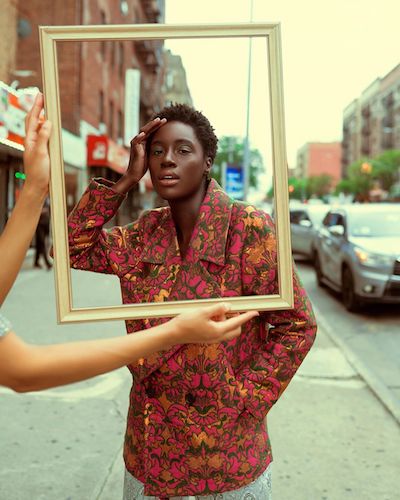
Rewind the clock to 2010, and you will find young Obidi Nzeribe taking pictures of his ten-year-old sister getting her makeup done on a Blackberry phone. Filled with excitement, he plastered the portraits across his Facebook feed. In late 2011, his parents recognized his interest in taking photos and purchased a small camera, with which Obidi would begin to shoot vigorously until he purchased his very own DSLR, the Canon T3i Rebel.
10 years later, Obidi has blossomed as a fashion photographer shooting for various publications including GQ, and he has created a variety of photography projects, including "Don't touch my hair," "Portrait of a Lady" and "Lily in Gele." His photos are exemplary, boasting edgy fashion with an ample array of vibrant colors, and his work is heavily influenced by artists such as Steven Meisel, Edward Enninful and Lindsay Adler.
Born and raised in Nigeria, Obidi grew up in a Black nation where he consumed works by Nigerian writers and grew up in a place where most celebrities were Black. Upon moving to America in 2013, he experienced culture shock.
“Coming to the U.S. I didn't see myself as Black, I saw myself as Nigerian," Obidi explained. "It wasn’t until I came to America where they said I was Black. I grew up watching Disney and being very involved with American media. How race operates in America really shocked me because it's so complex. Growing up in a place where everyone looks like you, then leaving that life to come somewhere else, and you start to realize the beauty standard there, doesn't look like you, it looks like someone else."
The complexities deepened upon his realization that the media was a culprit for spreading false propaganda perpetuating false narratives about what society considers to be the 'ideal' person.
“We have to learn and unlearn how the media is used to dehumanize us on both ends and it's done by white media," Obidi said. "We need to realize there's so much work that needs to be done and that's where my work comes into play. I've had people tell me that they didn’t think dark skin was pretty. Even in Nigeria, they have a skin bleaching issue. I am trying to show in my work you don't need to be several shades lighter to be beautiful and you don't need your nose or lips to be smaller. If my work can push this image of beauty for people who look like me, I want to do that at whatever chance I get."

Image: Instagram.com/obidinzeribe
Obidi combines his upbringing in Nigeria with his experience in the United States to create visual portraits which are not only a reflection of his personal story but also a reminder that Black people belong in fashion. “It is not that we need these spaces, these spaces would not exist without us. We are very much the blueprint,” Obidi shares.
The photography mogul shared with us his artistic journey, some of his biggest influences and why highlighting Blackness is important.
What factors contributed to your growth as an artist?
My mom would always remind me not to compare myself to other people, so it really helped me because even when I started off with fashion, I would compare my work to other photographers who were doing it for 10 years and that was very unhealthy for me. But everyone's journey is different and where they are right now is not where I'm going to be. The more you compare yourself to other people, the less room for growth you have because you're always hating on your work. Also, one of my best friends in undergrad would always say complacency breeds mediocrity. Wherever you are right now don't settle so I feel like that’s where most of my growth has come from.

Image: Instagram.com/obidinzeribe
Who is your biggest influence?
Every Black photographer is doing the dang thing because we've been told not just by the world of fashion but even by camera companies that this is not for us but again we are in these spaces, we are showing out and we are doing better than everyone. I am just proud of us right now. And it's what's pushing and driving me to keep creating. Seeing that drive and power that we hold is something beautiful. If I have to be specific, there's Dante Maurice from Atlanta, he shoots Black models like me and it's nice to see. I also like Joshua Kissi, Kennedi Carter and Adrienne Raquel. The way she captures Black women is amazing. She is someone who is doing softness and warmth in her photos that make you want to cry.
Off-topic, as much as we're fighting for Black people to get recognition in these spaces, we have to fight even harder for Black women to get the love they're not getting and that's what Polly Irungu is doing. She has a new collective called Black Women Photographers and I think it's amazing. It's always going to be the man that is seen first before women because they will see it as superiority but again it's not that men are better. Your gender doesn't determine how good you are at photography.
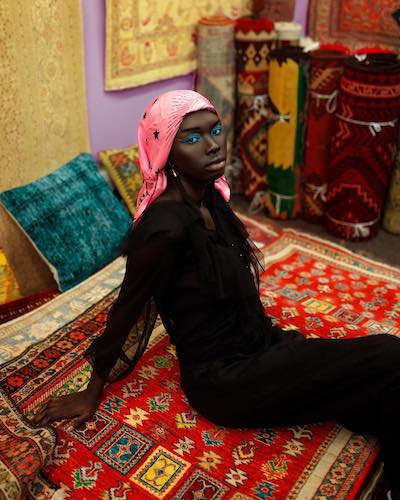
Image: Instagram.com/obidinzeribe
Why is it important to highlight Blackness in your work?
My work shows the other side of the Black experience. It's not always about the struggle and that's what I appreciate more about my work. There's this Ted Talk by Chimamanda Adichie and she was talking about the danger of a single story. She was saying the dangers about stereotypes, it’s not that they’re not true, they make one story become the only story. It's not that we are not struggling or we aren't fighting racism in America but that's not the only story. We also have black people in spaces creating fashion, we have Pyer Moss and we have so many of us in these spaces trying to create timeless fashion. You also have activists who are doing the groundwork. Both groups still have a purpose.
You might not recognize that one is doing work because it's fashion and it's glamorous, but they are doing some sort of work that might not be too in your face, but it's very much there and very much visible. Blackness is not one size fits all. There are beautiful variations. We are not all the same. We're all different people who all come from different backgrounds and we're all joined together by our skin. There are so many ways to be Black and they are all valid across the board.

Image: Instagram.com/obidinzeribe
What is your goal as an artist?
Trying to create a space for Black people and show that we belong here. I'm not really trying to get us a seat at the table, I'm trying to get us our own table cause again we don't have to beg to belong. Without our culture, fashion wouldn't be as exciting as it is. Lorraine O'Grady is an artist, I think it was 1983 in Harlem, she went to the African American Festival and she took a gold frame to take photos of Black people in all their beauty and just having fun. She titled it ‘Art is…’ and it was her response to her colleagues saying that Black people don’t exist in avantgarde spaces. I actually did my own version of that and I coupled it with a Sunday's best aesthetic to bring in the fashion element to my work. Sunday's best is a big thing for Black people, it’s a fashion show.
For me, it’s doing what Lorraine is doing. It’s trying to create these images that you would see down the line and there will never be a doubt in your mind that we belong and you will never question that there was a time where we weren't supposed to be in these spaces. I'm trying to create photographs that reinforce the mindset that we are valid.
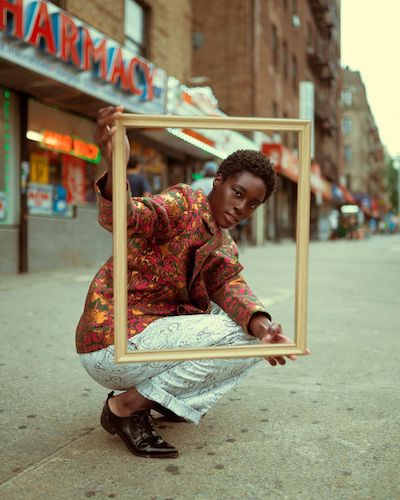
Image: Instagram.com/obidinzeribe
What is your favorite portrait?
The flowers in this portrait (below) show femininity and softness so having a dark-skinned Black woman in this space is a moment especially because Black women are often painted as aggressive because the idea of colorism has been engraved in us. I'm not saying that we need flowers to make us feminine. We don't at all like but showing her in a setting that is soft and feminine, is an image that needs to be seen.

Image: Instagram.com/obidinzeribe
I was trying to focus on beauty in its natural form. They're not wearing any makeup and the colors were muted or if there were any bright colors it was green. I was trying to show the beauty of our hair, how versatile our hair is and what it can do. You have the model in cornrows, threaded hairstyles bantu knots the shaved head and a baby with an afro. I wanted to show variations of Black women rocking hairstyles while showing beauty in its raw form.

Image: Instagram.com/obidinzeribe
We grew up thinking the Mona Lisa was beautiful and was a standard of beauty. Why can't we look at this photo as our standard of beauty and the standard of beauty? I don't think there should be one standard of beauty because beauty comes in different variations.
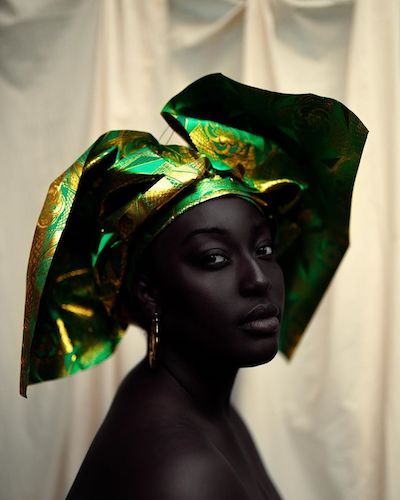
Image: Instagram.com/obidinzeribe
There’s no real story behind this photo. He just looks good and the suit looks great on him. You don’t always have to fight a battle with your work. It’s good to take breaks and create work that’s fun and has no meaning sometimes. We are complex individuals and we can enjoy more than one thing at a time. You can do whatever you want, you can have fun with it and be true to yourself. You don't have to force a story out if there's no story to tell.
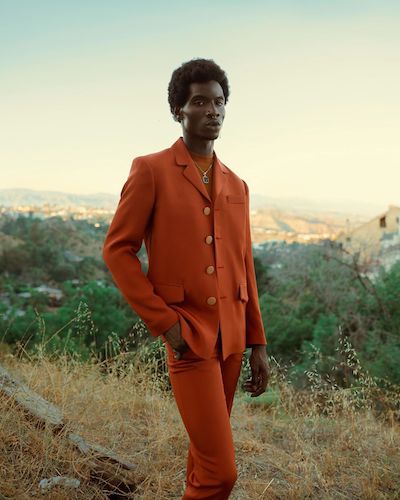
Image: Instagram.com/obidinzeribe
What do you like most about your work?
I like the representation that I'm able to provide in spaces where we haven't seen them as much. An area that my work lacks, as much as I'm providing this image of Black people for the world to see, is body diversity. I feel like I'm not telling a complete story because it has not been incorporated in my work yet. That's an area I critique myself a lot because it’s mostly skinny models in my work and that needs to change because again, I don't look like that myself. We need to show a variety of people in these fashion spaces because as much as they've told us that we don't belong in high-end fashion, they have told plus-sized people that as well.
I am not going to clap for myself for thirty minutes when I don't feel like my work has been doing all the groundwork it should be doing, so I definitely am trying to change that. I would like to add, having an upbringing in Nigeria and also living the later years of my life in America, I like the fact that my work is able to combine the cultures that I have experienced. My work is a melting pot of my life, so you can easily see influences from Nigeria and influences from America.

Image: Instagram.com/obinzeribe
Where do you see yourself as a photographer 10 years from now?
One major thing for me, I would like to photograph more fashion brands and magazines and have a say in what I am photographing. I really want to mentor kids into art and help them tell a story. I would like to go to a high school and give them a camera, a computer and create an internship program to show them the ropes. And of course, I want to photograph Beyoncé. I feel like if I ever did that I would quit photography. You cannot top that. There's a certain level of legendary when you reach it, you have to stop there. There’s no topping it.

Image: Instagram.com/obidinzeribe
POSTED IN LIFE, Get Inspired

 become a contributor
become a contributor


















